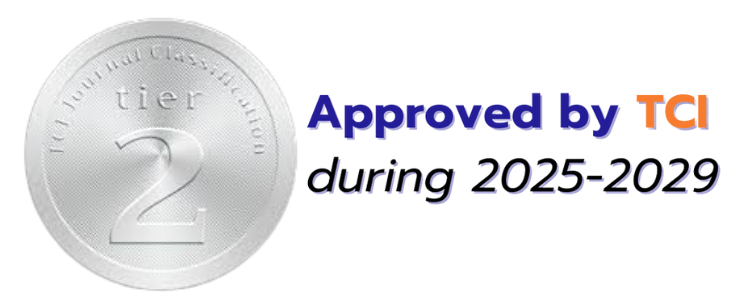การพัฒนารูปแบบการจัดการเรียนรู้เพื่อส่งเสริมความสามารถ ในการแก้ปัญหาทางคณิตศาสตร์ของนักเรียนขั้นมัธยมศึกษาปีที่ 3|The Development of an Instructional Model to Enhance Mathematics Problem-Solving Competency of Mathayomsuksa 3 Students
Keywords:
การพัฒนารูปแบบการจัดการเรียนรู้, ความสามารถในการแก้ปัญหาทางคณิตศาสตร์, The Development of an Instructional Model, Mathematics Problem-Solving CompetencyAbstract
การวิจัยครั้งนี้มีวัตถุประสงค์เพื่อ 1) พัฒนารูปแบบการจัดการเรียนรู้เพื่อส่งเสริมความสามารถในการแก้ปัญหาทางคณิตศาสตร์ ของนักเรียนชั้นมัธยมศึกษาปีที่ 3 2) เปรียบเทียบความสามารถในการแก้ปัญหาทางคณิตศาสตร์ ก่อนและหลังเรียนด้วยรูปแบบการจัดการเรียนรู้ที่พัฒนาขึ้น 3) ศึกษาความพึงพอใจต่อการเรียนวิชาคณิตศาสตร์ ด้วยรูปแบบการจัดการเรียนรู้ที่พัฒนาขึ้น ประชากร คือ นักเรียนชั้นมัธยมศึกษาปีที่ 3 โรงเรียนบางหลวงวิทยา จังหวัดนครปฐม ปีการศึกษา 2557 จำนวน 74 คน กลุ่มตัวอย่าง คือ นักเรียนชั้นมัธยมศึกษาปีที่ 3/1 โรงเรียนบางหลวงวิทยา จังหวัดนครปฐม ปีการศึกษา 2557 จำนวน 35 คน เครื่องมือที่ใช้เก็บรวบรวมข้อมูลได้แก่ 1) แผนการจัดการเรียนรู้ 2) แบบวัดความสามารถในการแก้ปัญหาทางคณิตศาสตร์ 3) แบบสอบถามความพึงพอใจวิเคราะห์โดยใช้สถิติ ค่าเฉลี่ย ส่วนเบี่ยงเบนมาตรฐาน T-Test แบบ dependent sample ผลการวิจัยพบว่ารูปแบบการจัดการเรียนรู้เพื่อส่งเสริมความสามารถในการแก้ปัญหาทางคณิตศาสตร์ ประกอบด้วย 5 องค์ประกอบ คือ 1) หลักการ 2) วัตถุประสงค์ 3) ขั้นตอน/กระบวนการจัดการเรียนรู้มี 6 ขั้นตอนย่อย คือ 3.1) ขั้นทำความเข้าใจ 3.2) ขั้นวางแผนแก้ปัญหา 3.3) ขั้นแปลงข้อมูลที่มีในโจทย์ 3.4) ขั้นดำเนินการตามแผน 3.5) ขั้นตรวจสอบความถูกต้องและความรู้ 3.6) ขั้นแลกเปลี่ยนความคิดเห็น 4) ระบบสนับสนุน และ 5) การวัดและประเมินผล ผลการใช้รูปแบบที่พัฒนาขึ้น พบว่า 1) ความสามารถในการแก้ปัญหา ทางคณิตศาสตร์ เรื่อง ความน่าจะเป็น หลังเรียนสูงกว่าก่อนเรียนอย่างมีนัยสำคัญที่ 0.05 2) ความพึงพอใจต่อการเรียนวิชาคณิตศาสตร์ ด้วยรูปแบบการจัดการเรียนรู้ที่พัฒนาขึ้น อยู่ในระดับมาก
The purposes of this research were to 1) develop an instructional model to enhance mathematics problem-solving competency of Mathayomsuksa 3 students 2) compare students’ mathematics problem-solving competency before and after the implementation of the model and
3) study satisfaction of students on learning by the model. The sample of this research consisted of 35 Mathayomsuksa 3/1 students studying in the academic year 2014 in BangLuang School, Nakornpathom Province. The instruments employed to collect data were:1) lesson plans 2) problem-solving mathematics competency tests 3) satisfaction tests. The collected data was analyzed by mean, standard deviation, and t-test dependent. The research results Instructional Model to enhance mathematics problem-solving competency consisted of 5 components: 1) principles component
2) objectives component 3) process component including 3.1) Understanding 3.2) Planning 3.
3) Transforming 3.4) Implementation 3.5) Recheck knowledge and 3.6) Reflection 4) support system component 5) evaluating component. The results showed that 1) after the implementation of the model, students’ problem-solving mathematics competency was higher than before and significantly at the level of .05. and 2) students were satisfied with learning with the model at the high level.







